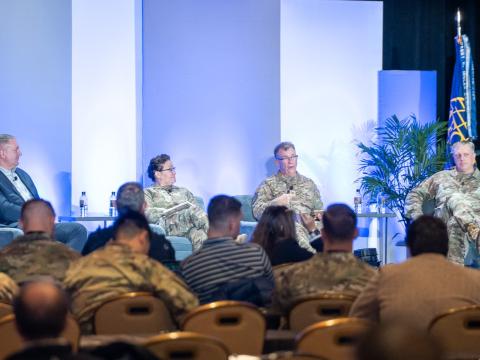AI Influencing Change in DISA, JFHQ-DODIN
Artificial intelligence (AI) is changing everything in defense information systems and operations, and the country that masters it will be positioned for global dominance. That was the lead point put forth by Lt. Gen. Robert J. Skinner, USAF, Defense Information Systems Agency (DISA) director and commander of the Joint Force Headquarters, Department of Defense Information Network (JFHQ-DODIN). Gen. Skinner emphasized this point by beginning a speech with a 45-second introduction that he later admitted was entirely generated and delivered by AI.
Gen. Skinner introduced this direct application of AI to the luncheon keynote audience at AFCEA’s TechNet Cyber 2023, being held in Baltimore May 2-4. Continuing this point, he described generative AI as “the most disruptive technologies and initiatives in a very long time.” Those who harness and leverage it—and how to protect against it—will have the high ground, he declared.
Applying generative AI to cybersecurity, intelligence and warfighting capabilities will require collaboration between industry and the military, the general continued. This will be necessary to understand, faster and better than the adversary, how AI can be leveraged. Gen. Skinner emphasized that the greater threat comes from lesser adversaries being able to leapfrog technology gaps and gain power faster than through normal processes.
Securing network systems and data in a world of AI requires several steps. One step being taken by the JFHQ-DODIN is to foundationally define standards, the general offers. Next is network operations, which will enable all aspects of the force to understand their responsibilities and assessments. The organization also is re-imagining how the command cyber readiness inspection (CCRI) will occur, and this will include continuous assessments to provide constant understanding of a command’s cyber posture.
Boundary security also is under review. Gen. Skinner said that the large number of capabilities in the boundary generate a lot of collisions. So, the organization is looking for better ways of providing boundary security, possibly from commercial capabilities and approaches. Simplifying boundary defense from today’s complex situation would help harmonize user experience in cybersecurity, which cannot be done under current conditions.
The foundation of zero trust is identity management, and Gen. Skinner introduced the audience to Gabe Solomon, a cloud engineer with DISA’s Hosting and Compute Center. The general admitted to Solomon’s relative youth, noting that DISA hired him right out of high school, and he has been central to development of the Global Directory under the Thunderdome umbrella.
Solomon asked the audience, “Wouldn’t it be cool if you got your device logged in, and it just worked? Wouldn’t it be cool if we migrated historically manual IT functions into a DevSecOps pipeline? Wouldn’t it be cool if we had a true single sign-on capability? The answer to all of these questions is yes,” he declared.
But achieving that will be complicated, he allowed. Because some applications do not mesh with web-based authentication now in place, DISA is developing an active directory under a public directory umbrella. It would allow existing environments to create a one-way trust back to the global directory to provide user identity and authentication. Organizations could maintain their existing equipment and infrastructure while leveraging the security and identity aspects of the global directory.
“Global Directory is meant to evolve over time and shape the department’s identity and needs,” Solomon stated.
Youth Leading the Way for DevSecOps
Gen. Skinner brought out Col. Jennifer Carns, USAF, Future Operations division chief, JFHQ-DODIN, to explain the “Set the Globe” effort. It will establish a basic defensive posture to secure the DODIN, assure defensive cyber missions and establish the necessary conditions to enable full-spectrum operations globally. “The cyber domain remains a fast-paced environment where we need persistent engagement,” she said, pointing out that Set the Globe will increase shared situational awareness and collaboration. And, it will involve partners as well.
“Protecting the DODIN is a team effort,” Col. Carns added “A risk to one is a risk to all.”
Gen. Skinner also addressed the issue of zero trust. DISA’s Thunderdome pilot was just completed, and total of 31 different proposals are working their way through the process, he noted, and this goes beyond “host and compute.” The DevSecOps capability Vulcan enables those who need the environment, he said.




Comments